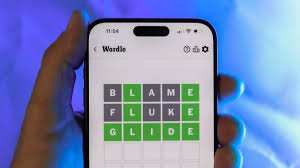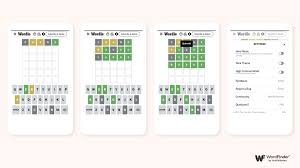Introduction of Mastering Wordle Hints :
Wordle has taken the world by storm, captivating puzzle enthusiasts with its simple yet challenging gameplay. Whether you’re a seasoned wordsmith or new to the game, understanding how to use Wordle hints effectively can make a big difference in your success. In this guide, we’ll explore what Wordle is, how its hints work, and strategies to optimize your gameplay for consistent wins.

What Is Wordle?
Wordle is a word puzzle game that gives players six chances to guess a five-letter mystery word. Created by Josh Wardle and now owned by The New York Times, it combines word knowledge with deduction skills. Each guess provides feedback in the form of colored tiles:
- Green tiles indicate the correct letter in the correct position.
- Yellow tiles signify the correct letter in the wrong position.
- Gray tiles mean the letter is not in the word.
Wordle’s simplicity and daily word challenges have made it an addictive brain teaser for millions.
Why Wordle Hints Matter
Wordle hints, which come from the colored feedback tiles, are the keys to solving the puzzle. They allow players to rule out incorrect letters and refine their guesses. Learning to interpret and apply these hints effectively is crucial to improving your Wordle skills.
Strategies for Using Wordle Hints
1. Start With Strong Words
The first word in Wordle sets the stage for success. Choose a starter word that contains common vowels (A, E, I, O, U) and frequently used consonants (R, S, T, L, N). Words like “RAISE,” “SLATE,” or “CRANE” are popular choices because they maximize letter coverage and provide valuable hints early on.
Pro Tip: Avoid repeating letters in your first guess to increase the diversity of information gained.
2. Analyze the Feedback
After your first guess, closely examine the color-coded feedback:
- Green letters are in their correct positions; lock them in for subsequent guesses.
- Yellow letters need repositioning; try placing them in different spots.
- Gray letters can be ruled out entirely; avoid them in future guesses.
Use this feedback to narrow down possibilities systematically.
3. Balance Vowels and Consonants
Words with a balanced mix of vowels and consonants often yield better hints. If your first guess doesn’t provide sufficient yellow or green tiles, try a second word with different vowels and consonants.
For example, if your initial guess was “RAISE” and only “R” turned green, follow up with a word like “ROUND” to test new vowels and positions.
4. Leverage Letter Frequency
Certain letters appear more frequently in five-letter English words. According to linguistic studies, “E,” “A,” “R,” “O,” and “T” are among the most common. Incorporating these letters into your guesses increases your chances of uncovering useful hints.
Common Mistakes to Avoid
Guessing Randomly
Random guesses waste opportunities and limit the effectiveness of Wordle hints. Always use your guesses to test specific letters or positions based on the feedback.
Ignoring Previous Feedback
Overlooking the importance of yellow and gray tiles is a critical error. For instance, if “E” is gray, avoid using it in subsequent guesses—it’s a confirmed non-starter.

Overcomplicating Guesses
While creativity can be helpful, trying overly complex or obscure words may reduce your chances of getting good hints. Stick to common five-letter words, especially in the early stages of the game.
Advanced Wordle Hint Strategies
1. Word Patterns and Structure
Pay attention to common word structures. For example, many English words follow patterns like:
- Vowel-Consonant-Vowel (e.g., “ALOHA”)
- Consonant-Vowel-Consonant (e.g., “PLANT”)
When green or yellow hints emerge, think about how they fit into these structures.
2. Elimination Technique
If multiple letters are confirmed as gray, focus on guesses that avoid these letters entirely. This elimination process helps you zero in on the correct word faster.
For example, if “C,” “A,” and “T” are gray, guesses like “HOUND” or “SLIME” will be more productive than “COAST.”
3. Endgame Tactics
By your fourth or fifth guess, your Wordle hints should have narrowed down the options significantly. Use your remaining guesses wisely by focusing on high-probability words. Avoid testing new letters unnecessarily—this stage is about locking in the solution.
Tools to Enhance Your Wordle Experience
Online Wordle Solvers
If you’re stuck, online Wordle solvers can suggest potential words based on your hints. These tools analyze your green, yellow, and gray tiles to generate a list of possibilities.
Word Lists and Frequency Charts
Referring to lists of five-letter words or letter frequency charts can provide inspiration for guesses. These resources are especially useful for beginners building their vocabulary.
Wordle Archive
Explore past Wordle puzzles in the Wordle archive. Solving older puzzles helps you practice interpreting hints and identifying patterns in the feedback.
The Psychology of Wordle Success
Part of Wordle’s charm lies in its mental challenge. The game rewards logical thinking, pattern recognition, and adaptability. Staying calm under pressure and approaching the puzzle methodically are key to maximizing your use of Wordle hints.
Mindfulness and Focus
Wordle requires concentration to analyze feedback and plan your next move. Treat each game as a mini brain workout, sharpening your problem-solving skills with every guess.
Patience and Persistence
While it’s tempting to solve the puzzle in just a few guesses, patience often leads to better outcomes. Trust the process of elimination and let the Wordle hints guide you step by step.
Fun Wordle Variants to Try
If you’ve mastered the standard Wordle, spice up your gameplay with these fun variants:
Dordle
Solve two Wordle puzzles simultaneously, with each guess contributing to both grids.
Quordle
A step up in difficulty, Quordle challenges players to solve four Wordle puzzles at once.
Absurdle
Unlike traditional Wordle, Absurdle actively resists your guesses, making the solution harder to pinpoint.
Wordle Etiquette and Sharing
Wordle is as much a social experience as it is a puzzle game. After solving the day’s word, players often share their results on social media. To keep the community thriving, follow these etiquette tips:
Avoid Spoilers
Never reveal the solution in public posts. Instead, share your result grid, which shows your guesses and feedback without giving away the word.
Encourage Others
Wordle fosters a sense of camaraderie among players. Celebrate others’ successes and offer encouragement when they’re stuck.

Final Thoughts
Mastering Wordle hints is a journey that combines vocabulary skills, logical thinking, and a bit of luck. By understanding the feedback system and applying strategic guessing techniques, you can improve your Wordle performance and enjoy the game to its fullest.
Whether you’re solving the puzzle solo or competing with friends, the joy of cracking the code makes every Wordle victory worth the effort. So grab your device, start guessing, and let the hints lead you to word mastery!
